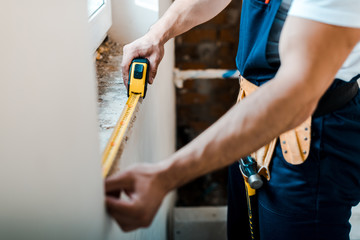Plumber Aurora CO professionals are responsible for installing, repairing and maintaining the pipes and fixtures that ensure clean water supply and proper drainage in residential and commercial settings. They also interpret blueprints and plans and ensure compliance with building codes and regulations.
Without the plumbing industry, showers and baths would be cold, and health problems may arise. Plumbers also work odd hours and are on-call for emergencies.
Educational Requirements
 The first step in becoming a plumber is earning a high school diploma or equivalent. After that, you must obtain the proper training. This can be achieved through a formal union or trade organization apprenticeship, a program at a technical or vocational school, or by working under a master plumber for a certain number of years. It is also possible to pursue education in the field of plumbing through online learning programs.
The first step in becoming a plumber is earning a high school diploma or equivalent. After that, you must obtain the proper training. This can be achieved through a formal union or trade organization apprenticeship, a program at a technical or vocational school, or by working under a master plumber for a certain number of years. It is also possible to pursue education in the field of plumbing through online learning programs.

Apprenticeships provide hands-on experience and can last between four and five years. They combine on-the-job training with classroom instruction and cover topics such as local plumbing codes, blueprint reading, and safety practices. After completing an apprenticeship, you will need to obtain a license in order to work independently. Licensing requirements vary by location, but they typically involve passing an exam and demonstrating a minimum amount of work experience. Plumbers are also required to carry general liability insurance to protect themselves from property damage while on the job.
A successful plumber needs to have a strong understanding of the principles of physics and the design of plumbing systems. They must be familiar with a variety of tools and equipment, including pipe cutters, wrenches, and drain snakes. In addition, plumbers must be able to read and understand schematic drawings. They should also be knowledgeable about environmental regulations and the effects of their work on the environment.
Another essential skill is customer service. Since plumbers often deal with customers, they need to be able to listen to their concerns and explain complex plumbing issues in simple terms. They should also be able to respond quickly and accurately to inquiries. Finally, they must be able to work well under pressure and in tight spaces.
Many plumbers choose to become members of professional groups such as the American Society of Plumbing Engineers or the Plumbing-Heating-Cooling Contractors Association. These organizations can offer networking opportunities and access to exclusive educational resources. They can also help you find an apprenticeship or job in your area. In addition, they can provide you with additional training and certifications in specialized areas such as green plumbing.
Licensing Requirements
Depending on where you live, there will be different licensing requirements to become a plumber. Most jurisdictions will have some sort of apprenticeship or entry-level training program that you must participate in before applying for your license. This could be through a formal union or trade organization apprenticeship, a college degree program, or work experience under a master plumber. Some localities may also require that you pass a written exam to become licensed.
For example, New York City requires that you complete a five-year apprenticeship and have several years of on-the-job experience as a journeyman plumber to qualify to apply for your master plumber license. This is in addition to passing a practical exam, a background investigation, and being a citizen of the United States.
Another important requirement to become a plumber is having customer service skills. Since plumbers often interact directly with customers, it is essential that they are able to listen to their needs and explain complicated plumbing issues clearly. This can help ensure that the client understands what the issue is and how it will be resolved, which can prevent future problems.
Plumbers must also have the right tools and equipment to perform their job. This can include various types of wrenches, pliers, and other hand tools, as well as diagnostic tools such as pressure gauges, thermocouples, and flow meters. In some cases, plumbers must also have the ability to operate heavy machinery such as power washers and sandblasters.
Plumbing work can be very physically demanding, and there is always the potential for injury. For this reason, plumbers must have workers’ compensation insurance to cover medical expenses and lost wages in the event of an accident. Additionally, plumbers must have general liability insurance to protect themselves from claims from third parties.
Plumbers must renew their licenses on a regular basis. There are usually fees associated with renewal, and late penalties can be significant. In some cases, the state may even suspend a plumber’s license if they fail to meet the required renewal deadlines.
Working Conditions
The plumbing trade offers many benefits, including job security and stability and competitive salaries. However, it also requires hard work and physical demands, including heavy lifting and working in tight spaces. Plumbers also need to be prepared to deal with hazards such as chemicals, sewage, and high-pressure systems. They may also be exposed to infectious diseases and hazardous materials. Some plumbers also choose to become self-employed, which provides greater flexibility and earning potential.
Plumbers can work in a variety of settings, from residential to commercial and industrial. They often work alongside other construction tradespeople, such as carpenters and electricians. They may also need to read and interpret blueprints and other technical information. They may also be responsible for laying out piping systems and installing fixtures and appliances. They must also be able to respond quickly to emergency calls.
Most plumbers work around 40 hours per week, but they may have to stay on call at night and on weekends. They may also need to travel between different jobs. In some cases, plumbers are required to wear protective gear and use specialized tools. They may also be exposed to hazardous substances or bad weather conditions.
The best plumbing companies provide their employees with a number of practical benefits, including health insurance, life and disability insurance, and vacation time. Providing these benefits will help ensure that your plumbers are healthy and happy. This will help reduce turnover and improve productivity. Moreover, it will also help you attract and retain qualified plumbers. So, it’s important to take the time to review your current benefits package and consider whether or not it is meeting the needs of your employees.
Salary
Plumbers perform a wide range of tasks to ensure that water supply lines and drainage systems function properly. Their responsibilities include inspecting and testing plumbing systems; fixing leaks, detecting and resolving pipe blockages; installing new pipes and fixtures; connecting appliances like sinks, toilets, and dishwashers to the plumbing network; and ensuring compliance with building codes and safety regulations. Plumbers use a variety of tools and materials to complete their work. In addition, they regularly interact with customers to discuss their options and provide estimates for services.
Plumber salaries vary widely depending on experience, location, license type, and specialization. Individuals who specialize in backflow prevention or are certified in green building practices may see higher wages. The economy also influences plumber salaries; a strong national economy generally leads to higher job prospects and potentially higher wages.
Residential plumbers usually earn the most, followed by industrial and commercial plumbers. The average salary for a plumber is $50,000 – $60,000 per year. However, skilled individuals can easily exceed these rates, especially in high-demand regions with robust economies and higher living costs.
In addition to a competitive base pay, plumbers can earn lucrative bonuses and overtime allowances. They can also build up a strong reputation that drives additional income opportunities over time, such as through referrals and word-of-mouth advertising.
While starting your own service business is one of the fastest ways to boost your salary, it’s not without its challenges. Managing and growing a successful plumber business requires extensive knowledge, certifications, and ongoing training. Additionally, you must also invest in the right tools and software to streamline your operations.
Whether you’re an experienced professional looking to make the most of your career or a newcomer seeking a rewarding, stable profession, the plumbing industry has something to offer everyone. With a competitive salary, ample growth potential, and a steady demand for skilled workers, the future of plumbing looks promising. Just remember to stay up-to-date with the latest technological developments and industry regulations to maximize your earning potential.


